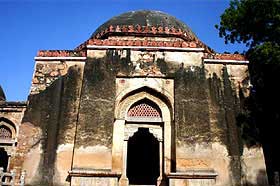Delhi Sultanate
The reign of Firoz Tughlaq was more notable for his administration. He strictly followed the advice of the ulemas in running the administration. He pleased the nobles and assured hereditary succession to their properties. Thus the iqta system was not only revived but also it was made hereditary. As per the Islamic law he levied the taxes.
Jiziya was strictly imposed on non-Muslims. He was the first Sultan to impose irrigation tax. But at the same time he dug irrigation canals and wells. The longest canal was about 200 kilometres from Sutlej to Hansi. Another canal was between Yamuna and Hissar. There were about 1200 fruit gardens in and around Delhi yielding more revenue. The special tax on 28 items was abolished by him since they were against the Islamic law. He also developed royal factories called karkhanas in which thousands of slaves were employed. About 300 new towns were built during his reign. The famous among them was Firozabad near Red Fort in Delhi, now called Firoz Shah Kotla. Old monuments like Jama Masjid and Qutb-Minar were also repaired.
 |
| Tomb of Firoz Tughlaq |
In this respect he was the precursor of Sikandar Lodi and Aurangazeb. Also he increased the number of slaves by capturing the defeated soldiers and young persons. In his regime the number of slaves had increased to one lakh eighty thousand. When Firoz died in 1388 the struggle for power between the Sultan and the nobles started once again. His successors had to face the rebellion of the slaves created by Firoz.
Information related to the search:
Delhi Sultanate, firoz, india, history, delhi, slaves, called, muslims, sultanate, irrigation, sultan, created, increased, imposed, canal, hereditary, administration, tughlaq, reign, strictly, ulemas, islamic, nobles, jiziya